初中英语三大从句总结
初中英语语法——三大从句汇总(重点笔记)
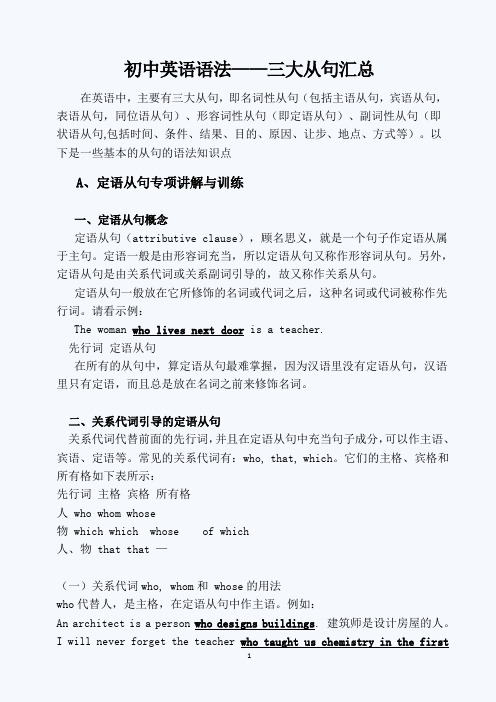
初中英语语法——三大从句汇总在英语中,主要有三大从句,即名词性从句(包括主语从句,宾语从句,表语从句,同位语从句)、形容词性从句(即定语从句)、副词性从句(即状语从句,包括时间、条件、结果、目的、原因、让步、地点、方式等)。
以下是一些基本的从句的语法知识点A、定语从句专项讲解与训练一、定语从句概念定语从句(attributive clause),顾名思义,就是一个句子作定语从属于主句。
定语一般是由形容词充当,所以定语从句又称作形容词从句。
另外,定语从句是由关系代词或关系副词引导的,故又称作关系从句。
定语从句一般放在它所修饰的名词或代词之后,这种名词或代词被称作先行词。
请看示例:The woman who lives next door is a teacher.先行词定语从句在所有的从句中,算定语从句最难掌握,因为汉语里没有定语从句,汉语里只有定语,而且总是放在名词之前来修饰名词。
二、关系代词引导的定语从句关系代词代替前面的先行词,并且在定语从句中充当句子成分,可以作主语、宾语、定语等。
常见的关系代词有:who, that, which。
它们的主格、宾格和所有格如下表所示:先行词主格宾格所有格人 who whom whose物 which which whose of which人、物 that that —(一)关系代词who, whom和 whose的用法who代替人,是主格,在定语从句中作主语。
例如:An architect is a person who designs buildings. 建筑师是设计房屋的人。
I will never forget the teacher who taught us chemistry in the firstyear of my senior middle school.我将永远不会忘记在高一时教我们化学的那位老师。
Anyone who wants to apply for this job must send us the resume by email first. 想应聘这个职位的任何人都必须先通过电子邮件向我们发送简历。
初中英语语法——三大从句汇总
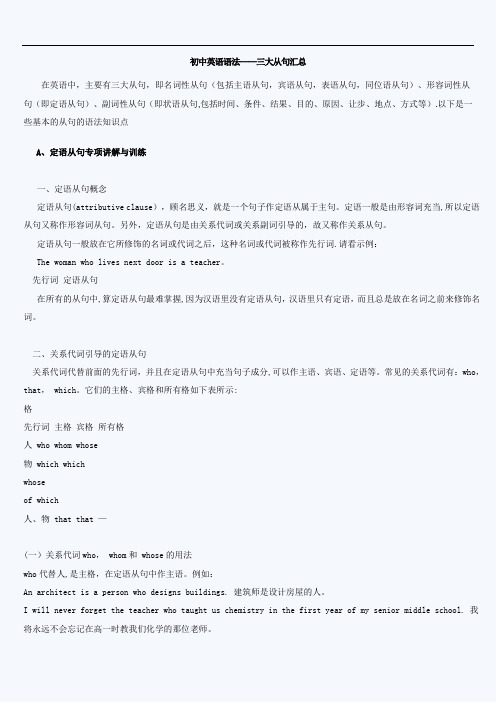
初中英语语法——三大从句汇总在英语中,主要有三大从句,即名词性从句(包括主语从句,宾语从句,表语从句,同位语从句)、形容词性从句(即定语从句)、副词性从句(即状语从句,包括时间、条件、结果、目的、原因、让步、地点、方式等).以下是一些基本的从句的语法知识点A、定语从句专项讲解与训练一、定语从句概念定语从句(attributive clause),顾名思义,就是一个句子作定语从属于主句。
定语一般是由形容词充当,所以定语从句又称作形容词从句。
另外,定语从句是由关系代词或关系副词引导的,故又称作关系从句。
定语从句一般放在它所修饰的名词或代词之后,这种名词或代词被称作先行词.请看示例:The woman who lives next door is a teacher。
先行词定语从句在所有的从句中,算定语从句最难掌握,因为汉语里没有定语从句,汉语里只有定语,而且总是放在名词之前来修饰名词。
二、关系代词引导的定语从句关系代词代替前面的先行词,并且在定语从句中充当句子成分,可以作主语、宾语、定语等。
常见的关系代词有:who,that, which。
它们的主格、宾格和所有格如下表所示:格先行词主格宾格所有格人 who whom whose物 which whichwhoseof which人、物 that that —(一)关系代词who, whom和 whose的用法who代替人,是主格,在定语从句中作主语。
例如:An architect is a person who designs buildings. 建筑师是设计房屋的人。
I will never forget the teacher who taught us chemistry in the first year of my senior middle school. 我将永远不会忘记在高一时教我们化学的那位老师。
Anyone who wants to apply for this job must send us the resume by email first. 想应聘这个职位的任何人都必须先通过电子邮件向我们发送简历。
英语三大类基本从句
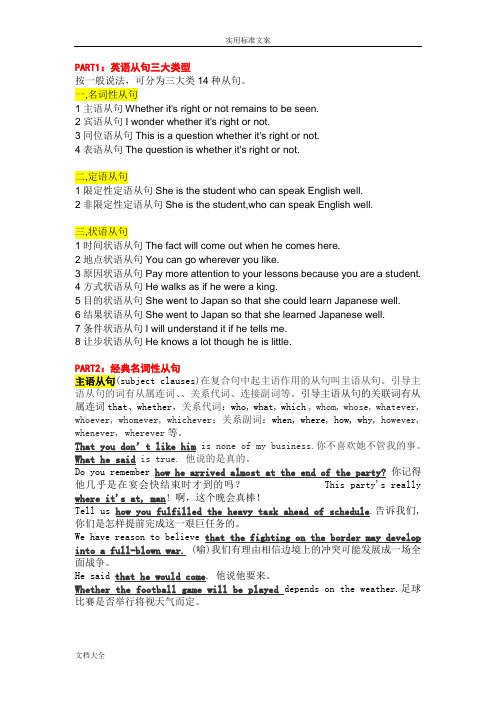
PART1:英语从句三大类型按一般说法,可分为三大类14种从句。
一,名词性从句1主语从句Whether it's right or not remains to be seen.2宾语从句I wonder whether it's right or not.3同位语从句This is a question whether it's right or not.4表语从句The question is whether it's right or not.二,定语从句1限定性定语从句She is the student who can speak English well.2非限定性定语从句She is the student,who can speak English well.三,状语从句1时间状语从句The fact will come out when he comes here.2地点状语从句You can go wherever you like.3原因状语从句Pay more attention to your lessons because you are a student. 4方式状语从句He walks as if he were a king.5目的状语从句She went to Japan so that she could learn Japanese well.6结果状语从句She went to Japan so that she learned Japanese well.7条件状语从句I will understand it if he tells me.8让步状语从句He knows a lot though he is little.PART2:经典名词性从句主语从句(subject clauses)在复合句中起主语作用的从句叫主语从句。
初中英语语法三大从句汇总

英语语法三大从句汇总在英语中,主要有三大从句,即名词性从句(包括主语从句,宾语从句,表语从句,同位语从句)、形容词性从句(即定语从句)、副词性从句(即状语从句,包括时间、条件、结果、目的、原因、让步、地点、方式等)。
以下是一些基本的从句的语法知识点定语从句一、定语从句概念定语从句(attributive clause),就是一个句子作定语从属于主句。
定语一般是由形容词充当,所以定语从句又称作形容词从句。
定语从句一般放在它所修饰的名词或代词之后,这种名词或代词被称作先行词。
The woman who lives next door is a teacher.先行词定语从句二、关系代词引导的定语从句关系代词代替前面的先行词,并且在定语从句中充当句子成分,可以作主语、宾语、定语等。
常见的关系代词有:who, that, which。
它们的主格、宾格和所有格如下表所示:格先行词主格宾格所有格人who whom whose物which whichwhoseof which人、物that that —2)主语从句1.定义:用作主语的从句叫做主语从句。
2.构成:关联词+简单句3.引导主语从句的关联词有三类:(1)从属连词that.如:That they were in truth sisters was clear from the facial resemblance between them.很明显,她们确是亲姐妹,她们的脸型很相似。
(2)从属连词whether.如:Whether he’ll e here isn’t clear.他是否会来这里还不清楚。
(3)连接代词who,whom,whose,what,which,whoever,whatever,whichever 连接副词where,when,how,why.如:What she did is not yet known.她干了什么尚不清楚。
How this happened is not clear to anyone.这事怎样发生的,谁也不清楚。
英语三大从句类型总结

英语三大从句类型总结PART1:英语从句三大类型按一般说法,可分为三大类14种从句。
一,名词性从句1主语从句Whether it's right or not remains to be seen.2宾语从句I wonder whether it's right or not.3同位语从句This is a question whether it's right or not.4表语从句The question is whether it's right or not.二,定语从句1限定性定语从句She is the student who can speak English well.2非限定性定语从句She is the student,who can speak English well.三,状语从句1时间状语从句The fact will come out when he comes here.2地点状语从句You can go wherever you like.3原因状语从句Pay more attention to your lessons because you are a student. 4方式状语从句He walks as if he were a king.5目的状语从句She went to Japan so that she could learn Japanese well.6结果状语从句She went to Japan so that she learned Japanese well.7条件状语从句I will understand it if he tells me.8让步状语从句He knows a lot though he is little.PART2:经典名词性从句主语从句subject clauses在复合句中起主语作用的从句叫主语从句。
初中英语三大从句
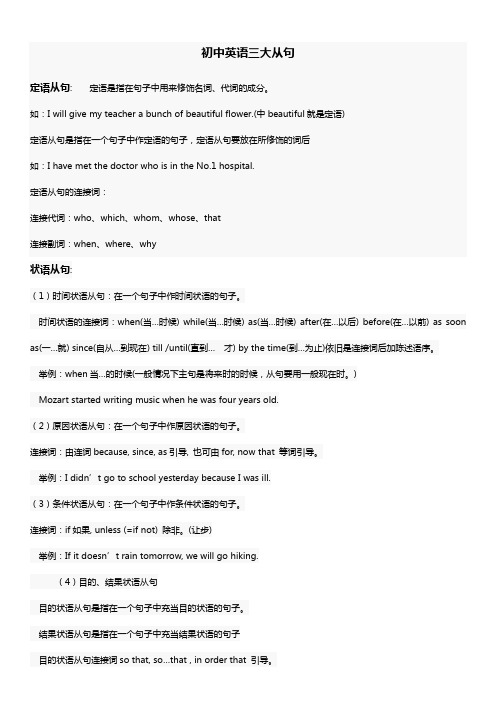
初中英语三大从句定语从句: 定语是指在句子中用来修饰名词、代词的成分。
如:I will give my teacher a bunch of beautiful flower.(中beautiful就是定语)定语从句是指在一个句子中作定语的句子,定语从句要放在所修饰的词后如:I have met the doctor who is in the No.1 hospital.定语从句的连接词:连接代词:who、which、whom、whose、that连接副词:when、where、why状语从句:(1)时间状语从句:在一个句子中作时间状语的句子。
时间状语的连接词:when(当…时候) while(当…时候) as(当…时候) after(在…以后) before(在…以前) as soon as(一…就) since(自从…到现在) till /until(直到…才) by the time(到…为止)依旧是连接词后加陈述语序。
举例:when当…的时候(一般情况下主句是将来时的时候,从句要用一般现在时。
)Mozart started writing music when he was four years old.(2)原因状语从句:在一个句子中作原因状语的句子。
连接词:由连词because, since, as引导, 也可由for, now that 等词引导。
举例:I didn’t go to school yesterday because I was ill.(3)条件状语从句:在一个句子中作条件状语的句子。
连接词:if如果, unless (=if not) 除非。
(让步)举例:If it doesn’t rain tomorrow, we will go hiking.(4)目的、结果状语从句目的状语从句是指在一个句子中充当目的状语的句子。
结果状语从句是指在一个句子中充当结果状语的句子目的状语从句连接词so that, so…that , in order that 引导。
英语三大从句

③在不定式 to do 前 e.g: I don’t know whether to do it. ④ 在谓语动词discuss的后面
3) 特殊疑问词 分两类:疑问副词和疑问代词。①疑问副词只能做状语
2、 定语从句的定义:在复合句中作定语的句子叫做定语从句,定语从句的作用是修饰前面的先行词或主句
其他成分。
I have a sister. She is a student.
请把这两个简单句改成包含定语从句的复合句。 I have a sister who is a student.
定语从句的关系词分类:
B 3.--- Hi, Alice. I wonder ________ . -- I often go swimming in the sports center.
A.where you skate
B.what you do on the weekend
C.when you exercise
D.whether you enjoy your weekend
Whether you want to go or not, you have to go.
4)“no matter➕疑问词”,或“疑问词➕ever”,表示“无论…” ★Exercises 翻译: 1.无论你去哪里,无论你做什么,我都会在这里等你。 Wherever you go ,whatever you do,I will be right here waiting for you.(摘自歌 曲Right Here Waiting) (转为同义句) No matter where you go,no matter what you do,I will be right here waiting for you.
初中中考英语知识点总结三大从句
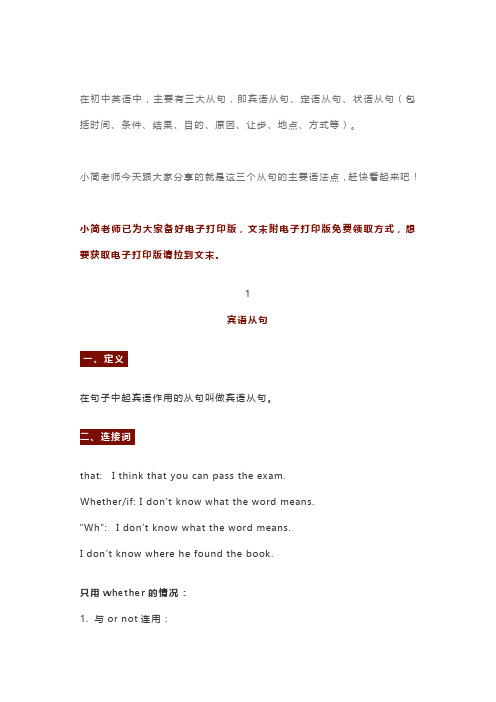
在初中英语中,主要有三大从句,即宾语从句、定语从句、状语从句(包括时间、条件、结果、目的、原因、让步、地点、方式等)。
小简老师今天跟大家分享的就是这三个从句的主要语法点,赶快看起来吧!小简老师已为大家备好电子打印版,文末附电子打印版免费领取方式,想要获取电子打印版请拉到文末。
1宾语从句在句子中起宾语作用的从句叫做宾语从句。
that: I think that you can pass the exam.Whether/if: I don’t know what the word means.“Wh”: I don’t know what the word means.I don’t know where he found the book.只用whether的情况:1. 与or not连用:I don’t know whether it’s raining or not.2. 与动词不定式连用:He doesn’t know whether to accept the invitation.3. 连接词前有介词时:It depends on whether he is coming.1. 主句是一般现在时态,从句根据实际情况而定(各种时态均可)She wants to know what he has done for the exam.2.主句是一般过去时态,从句用相应的过去的时态。
1)She said that she was a student.2)She said that she would fly to Japan in a week.3)She said that she had finished her homework already.3. 如果宾语从句说的是客观真理、自然现象或事实时,这时宾语从句要用一般现在时态。
The teacher said that the earth goes round the sun.2定语从句在复合句中修饰名词、代词的从句叫定语从句。
初中英语语法三大从句汇总
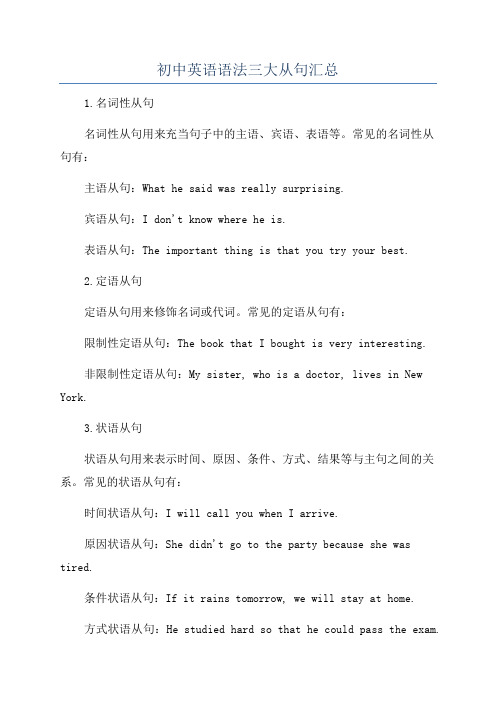
初中英语语法三大从句汇总
1.名词性从句
名词性从句用来充当句子中的主语、宾语、表语等。
常见的名词性从句有:
主语从句:What he said was really surprising.
宾语从句:I don't know where he is.
表语从句:The important thing is that you try your best.
2.定语从句
定语从句用来修饰名词或代词。
常见的定语从句有:
限制性定语从句:The book that I bought is very interesting.
非限制性定语从句:My sister, who is a doctor, lives in New York.
3.状语从句
状语从句用来表示时间、原因、条件、方式、结果等与主句之间的关系。
常见的状语从句有:
时间状语从句:I will call you when I arrive.
原因状语从句:She didn't go to the party because she was tired.
条件状语从句:If it rains tomorrow, we will stay at home.
方式状语从句:He studied hard so that he could pass the exam.
结果状语从句:She was so tired that she couldn't walk.。
初中英语三大从句
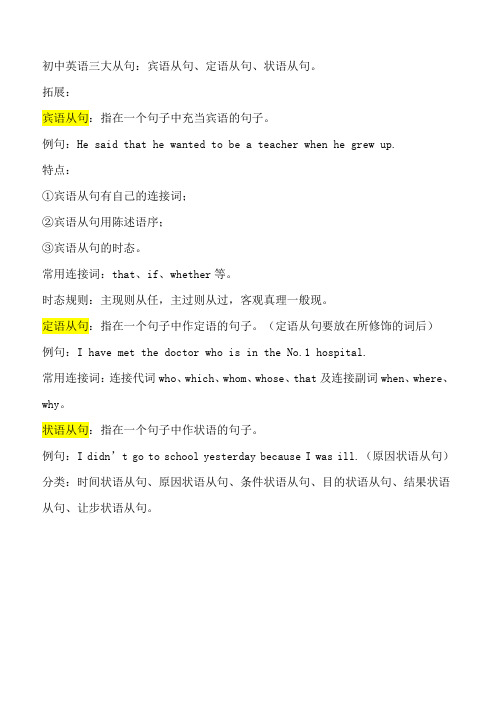
初中英语三大从句:宾语从句、定语从句、状语从句。
拓展:
宾语从句:指在一个句子中充当宾语的句子。
例句:He said that he wanted to be a teacher when he grew up.
特点:
①宾语从句有自己的连接词;
②宾语从句用陈述语序;
③宾语从句的时态。
常用连接词:that、if、whether等。
时态规则:主现则从任,主过则从过,客观真理一般现。
定语从句:指在一个句子中作定语的句子。
(定语从句要放在所修饰的词后)
例句:I have met the doctor who is in the No.1 hospital.
常用连接词:连接代词who、which、whom、whose、that及连接副词when、where、why。
状语从句:指在一个句子中作状语的句子。
例句:I didn’t go to school yesterday because I was ill.(原因状语从句)分类:时间状语从句、原因状语从句、条件状语从句、目的状语从句、结果状语从句、让步状语从句。
(完整版)初中英语从句__汇总

从句专项在英语中,主要有三大从句,即名词性从句(包括主语从句,宾语从句,表语从句,同位语从句)、形容词性从句(即定语从句)、副词性从句(即状语从句,包括时间、条件、结果、目的、原因、让步、地点、方式等)。
定语从句定语从句(attributive clause),顾名思义,就是一个句子作定语从属于主句。
定语一般是由形容词充当,所以定语从句又称作形容词从句。
另外,定语从句是由关系代词或关系副词引导的,故又称作关系从句。
定语从句一般放在它所修饰的名词或代词之后,这种名词或代词被称作先行词。
请看示例:The woman who lives next door is a teacher.先行词定语从句在所有的从句中,算定语从句最难掌握,因为汉语里没有定语从句,汉语里只有定语,而且总是放在名词之前来修饰名词宾语从句宾语从句是英语复合句中的其中非常重要的从句之一。
它是用一个句子做另一个句子的宾语,将这个句子叫做宾语从句。
宾语从句做介词或及物动词的宾语。
现在从下列三个方面总结归纳如下:一,引导词A,由that 引导的陈述句性的宾语从句,在很多动词如say, think, wish , hope, see, believe, agree, expect, hear , feel等动词后。
连词that 只起连接作用,在从句中不做句子的成分例:I told him that he was wrong.l在think,believe, suppose, expect等动词引起的宾语从句中,有时谓语尽管是否定意义,却不用否定形式,而将think 等动词变为否定形式。
例:I don’t think you are right. (我认为你做的不对)l在许多带有复合宾语的句子中,that引导的宾语从句经常移到句子的后面,而用it做形式宾语。
例:We think it wrong that he told a lie to everyone (我认为他向每一个人撒谎是错误的)B,由连词if、whether 引导的表示“是否…”的宾语从句。
初中重点语法三大从句总结

关系代词在定语从句中作宾语时,可以省略;关系代词that和 which在定语从句中作主语时,不能省略。
关系副词引导定语从句
关系副词的作用
在定语从句中充当状语,引导定语从句修饰先行词。
常用的关系副词
when, where, why。
使用注意事项
关系副词引导的定语从句一般修饰表示时间、地点和原因的名词;在定语从句中,关系副 词可以转换成“介词+which”的结构。
状语性从句练习题及解析
练习题 I won't go to the party _______ I'm
invited.
We will start as soon as our team leader comes.
解析
第一题答案为 unless,引导条件状语 从句,表示“除非我被邀请,否则我 不会去参加聚会”。
初中重点语法三大从句总结
• 引言 • 名词性从句 • 定语性从句(定语从句) • 状语性从句(状语从句) • 三大从句比较与联系 • 练习题与解析
01
引言
目的和背景
提高学生对从句的理解和运用能力
为高中英语从句学习打下基础
从句定义及分类
从句定义
从句是包含一个主谓结构但不能独立 成句的句子成分,它在复合句或复杂 句中充当一个成分。
第一题答案为 that/which,引导定语从句并在从句中 作宾语,先行词是book指物,所以关系词用 that/which。
The book _______ I got yesterday is written by him.
解析
第二题答案为 that/which,引导定语从句并在从句中 作visited的宾语,先行词是farm指物,所以关系词用 that/which。
初中英语语法总结,从句

初中英语语法总结,从句篇一:初中英语语法——三大从句汇总初中英语语法——三大从句汇总在英语中,主要有三大从句,即名词性从句(包括主语从句,宾语从句,表语从句,同位语从句)、形容词性从句(即定语从句)、副词性从句(即状语从句,包括时间、条件、结果、目的、原因、让步、地点、方式等)。
以下是一些基本的从句的语法知识点A、定语从句专项讲解与训练一、定语从句概念定语从句(attributive clause),顾名思义,就是一个句子作定语从属于主句。
定语一般是由形容词充当,所以定语从句又称作形容词从句。
另外,定语从句是由关系代词或关系副词引导的,故又称作关系从句。
定语从句一般放在它所修饰的名词或代词之后,这种名词或代词被称作先行词。
请看示例:The woman who lives next door is a teacher.先行词定语从句在所有的从句中,算定语从句最难掌握,因为汉语里没有定语从句,汉语里只有定语,而且总是放在名词之前来修饰名词。
二、关系代词引导的定语从句关系代词代替前面的先行词,并且在定语从句中充当句子成分,可以作主语、宾语、定语等。
常见的关系代词有:who, that, which。
它们的主格、宾格和所有格如下表所示:格先行词主格宾格所有格人 who whom whose物 which whichwhoseof which人、物 that that —(一)关系代词who, whom和 whose的用法who代替人,是主格,在定语从句中作主语。
例如:An architect is a person who designs buildings. 建筑师是设计房屋的人。
I will never forget the teacher who taught us chemistry in the first year of my senior middle school. 我将永远不会忘记在高一时教我们化学的那位老师。
初中英语语法讲解--名词性从句、形容词性从句、副词性从句三大从句讲解

初中英语语法讲解:名词性从句、形容词性从句、副词性从句一、名词性从句1. 概念名词性从句是指在句子中起名词作用的从句,包括主语从句、宾语从句、表语从句和同位语从句。
2. 搭配与用法主语从句:作为句子的主语,通常使用连接词that(无实际意义,不可省略)或whether/if(表示选择,不可省略)引导。
例句:That he will come to the party remains uncertain.(他是否会来参加聚会还不确定。
)宾语从句:作为动词或介词的宾语,可以由that、if/whether、特殊疑问词等引导。
例句:I don't know if he will come.(我不知道他是否会来。
)表语从句:作为连系动词的表语,通常由that引导,但that通常可以省略。
例句:The fact is that he didn't come.(事实是,他没来。
)同位语从句:用于解释说明前面的名词,通常由that引导,但that不可省略。
例句:The news that he resigned was a surprise.(他辞职的消息是个惊喜。
)3. 注意事项宾语从句中,当主句的谓语动词是think、believe、expect、suppose等表示心理活动的动词时,如果宾语从句表示的是事实,则宾语从句的否定通常要转移到主句上来表达。
例句:I don't think he will come.(我认为他不会来。
)在名词性从句中,一般不使用疑问句语序,而是使用陈述句语序。
例句:Can you tell me how I can get to the park?(请告诉我如何去公园?)而不是Can you tell me how can I get to the park?二、形容词性从句(定语从句)1. 概念形容词性从句,也称为定语从句,用于修饰或限定一个名词或代词,描述这个名词或代词的性质或特征。
中考英语重点语法三大从句总结
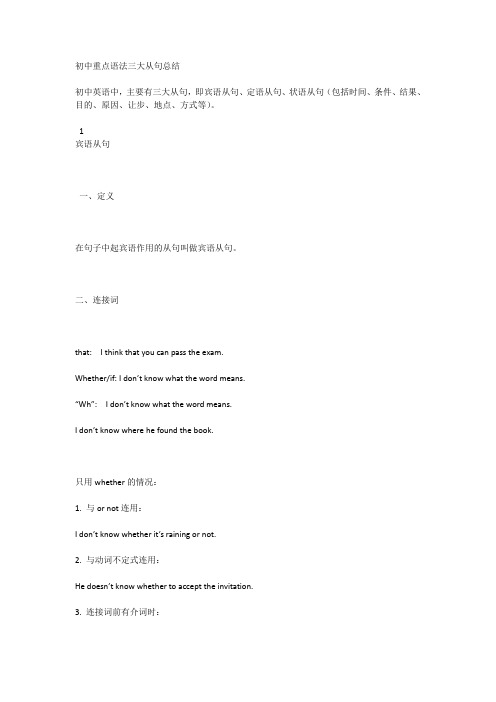
When the children had gone to bed, she began to prepare her lessons.
While ---在……期间,往往指一段时间。
While we were inAmerica, we saw him twice.
While ---表示一种不满情绪,意思是这边在干某种重要的事,而另一边在享受等。
If ---如果
If you don’t hurry up, you will miss the plane.
Unless ---如果不,除非=if not
We can’t get there on time unless we book the earliest flight
As long as ---只要
We will succeed as long as we keep on trying.
As (so) far as ---据……所知
As far as I know, he speaks English very well.
In case ---假使,如果
The plane cannot take off in case it rains.
Wherever ---无论哪里
Wherever you are, I will be right there waiting for you.
4.原因状语从句
because, as, since, now that,和considering that, seeing that这六个连词都用于表示表示原因,但在语气上一个比一个弱.
It is just a week since we arrived here.
初中英语三大从句总结

初中英语三大从句总结在初中的英语学习中,主要有三大从句,即宾语从句、定语从句、状语从句(包括时间、条件、结果、目的、原因、让步、地点、方式等)。
今天为大家整理了“从句”相关的知识点,!赶快学起来吧~01宾语从句一、定义在句子中起宾语作用的从句叫做宾语从句。
二、连接词that: I think that you can pass the exam.Whether/if: I don’t know what the word means.“Wh”:I don’t know what the word means.I don’t know where he found the book.只用whether的情况:1. 与or not连用:I don’t know whether it’s raining or not.2. 与动词不定式连用:He doesn’t know whether to accept the invitation.3. 连接词前有介词时:It depends on whether he is coming.三、时态1. 主句是一般现在时态,从句根据实际情况而定(各种时态均可)She wants to know what he has done for the exam.2.主句是一般过去时态,从句用相应的过去的时态。
She said that she was a student.She said that she would fly to Japan in a week.She said that she had finished her homework already.3. 如果宾语从句说的是客观真理、自然现象或事实时,这时宾语从句要用一般现在时态。
The teacher said that the earth goes round the sun.02定语从句一、定义在复合句中修饰名词、代词的从句叫定语从句。
- 1、下载文档前请自行甄别文档内容的完整性,平台不提供额外的编辑、内容补充、找答案等附加服务。
- 2、"仅部分预览"的文档,不可在线预览部分如存在完整性等问题,可反馈申请退款(可完整预览的文档不适用该条件!)。
- 3、如文档侵犯您的权益,请联系客服反馈,我们会尽快为您处理(人工客服工作时间:9:00-18:30)。
一. 宾语从句object clause:一. 定义definition:在句子中起宾语作用的从句叫做宾语从句。
二. 连接词connections:that: I think that you can pass the exam.Whether/if: I don’t know what the word means.“Wh”: I don’t know what the word means.I don’t know where he found the book.只用whether的情况:1. 与or not连用:I don’t know whether it’s raining or not.2. 与动词不定式连用:He doesn’t know whether to accept the invitation.3. 连接词前有介词时:It depends on whether he is coming.三. 时态tenses:1. 主句是一般现在时态,从句根据实际情况而定(各种时态均可)She wants to know what he has done for the exam.2.主句是一般过去时态,从句用相应的过去的时态。
1)She said that she was a student.2)She said that she would fly to Japan in a week.3)She said that she had finished her homework already.3. 如果宾语从句说的是客观真理、自然现象或事实时,这时宾语从句要用一般现在时态。
The teacher said that the earth goes round the sun.二. 定语从句Attributive clause:1.定义:在复合句中修饰名词、代词的从句叫定语从句2.先行词指人who /that先行词指物which/ that3. 定语从句一般紧跟被修饰的名词或代词(即先行词)后4.关系代词代替先行词在句子中担当成分,所以从句中不可再出现其他代替先行词的代词5.翻译方法“…. 的”Eg.1. Yesterday we bought a book which is really hard to understand.2. The students who are from Maple Leaf School like learning English.Whom: 先行词指人,则代替先行词在定语从句中充当宾语(包括介词的宾语), 与who的区别是如果前面带介词则必须用whom1.This is the teacher whom\who we like best.2. I don’t like the boy to whom you are talking.Whose : 指人或物,作定语,表示“…的”eg: Harry is the boy whose mother is our math teacher.关系代词只能that 的特殊情况:1.先行词前有序数词修饰时:This is the first gift that my parents bought me.2.先行词前有形容词最高级修饰时:This is the most exciting film that I have ever seen.3. 先行词是不定代词something, anything等时.e.g. Is there anything that you want in this shop4. 先行词是人和物时, 用that.e.g. He talked about some writers and books that were unknown to us all.5. 先行词被all , little , the only , the very(就是,正是), the last 等词修饰时,只能用thate.g. This is the last place that I want to visit.6. 特殊疑问句以who 或which 开头,只能用that引导.Who is the girl that is making a speech on the platform?当关系代词前使用介词时:物+介词+which ; 人+ 介词+ whom当关系代词前使用介词时:e.g. 1. This is the train by which we went to Beijing.2. This is the teacher to whom my mother is talking.三. 状语从句:Adverbial clauses定义:在复合句中由从句表示的状语称作状语从句,它可以用来修饰谓语(包括非谓语动词)、定语或状语,或是整个句子。
状语从句一般分为八大类时间状语从句地点状语从句原因状语从句目的状语从句结果状语从句条件状语从句方式状语从句让步状语从句1. 时间状语从句When ---当……时候, 通常指某一特定的时间点,主句与从句的动作同时发生。
When I opened the window, I saw him come up.When --- 正在……的时候,突然…。
通常主句是进行时或be about to 时,在翻译的时候,when 可以译成没想到或突然。
I was walking along the street , when I met him.When 当从句是进行时,主句是一般时,往往表示不满。
Someone knocked at the door when I was having breakfast.When=afterWhen the children had gone to bed, she began to prepare her lessons.While ---在……期间,往往指一段时间。
While we were in America, we saw him twice.While ---表示一种不满情绪,意思是这边在干某种重要的事,而另一边在享受等。
We are cleaning the classroom while they are playing the football.As --- 一边……一边, 随着She was doing her homework as she was listening to the music.As --- 当……时,指一个动作紧接着一个动作发生,从句通常用进行时。
As I was going out, it began to rain.The moment --- 一……就…… =as soon as , immediately,---Did you remember to give Mary the money you owed her?---Yes, I gave her the moment I saw her.Not… until --- 直到……才He didn’t leave the office until he finished the work.Before --- 在……之前The passengers should arrive at the airport an hour before the flight departs.After --- 在…… 之后The customer left the ticket counter after he had a quarrel with the ticket agent. Since ---自从……, 通常主句用现在完成时I have never been there again since I graduated from the university.It is just a week since we arrived here.As soon as --- 一……就……Jack went to school as soon as he got well.No sooner than --- 一……就……no sooner… than… 用于句首要求倒装Hardly …when…Scarcely …when…No sooner had he arrived than he went away again.Once --- 一但……就……Once you see him, you will never forget him.Every time, each time 每次whenever 每当Each time he came to town, he would visit our school.2.条件状语从句引导状语从句的连接词有:If如果, unless除非, as long as只要, As (so) far as --- 据……所知,in case万一, provided that假如, on condition that若是,以…为条件If ---如果If you don’t hurry up, you will miss the plane.Unless --- 如果不, 除非=if notWe can’t get there on time unless we book the earliest flightAs long as --- 只要We will succeed as long as we keep on trying.As (so) far as --- 据……所知As far as I know, he speaks English very well.In case --- 假使, 如果The plane cannot take off in case it rains.Provided that 如果,有时省略thatThe plane will be in good condition provided that it is taken care of carefully.On condition that --- 条件是…He said that he would come to the meeting on condition that no one asked him to speak.注:主从句的动作发生在将来时,则主句用将来时, 从句用一般现在时。
If he arrives tomorrow, I will be waiting for him at the airport.3.地点状语从句地点状语从句只有两个连词:Where, whereverWhere --- 在……地方Where there is a will, there is a way.Wherever --- 无论哪里Wherever you are, I will be right there waiting for you.4.原因状语从句because, as, since, now that, 和considering that, seeing that 这六个连词都用于表示表示原因, 但在语气上一个比一个弱.Because --- 因为,通常从句放在主句后.Mr Smith was very upset because he couldn’t find his luggage.As --- 因为, 通常放在句首As he is honest and modest, all his friends like him.Since ---既然因语气较弱, 常译为既然(众所周知的原因)Since everybody has come, we can set off.Now that --- 既然Now that you are here, you can join us.considering that --- 顾及到Considering that they are just beginners, they are doing quite a good job.seeing that --- 由于Seeing (that) quite a few people were absent, we decided toput the meeting off.5.结果状语从句引导结果状语从句的连词有:that, so that, so…that…such…thatSo… that --- 太……以至于so 后面应用形容词或副词, 有时省略so只用that Boeing 747 is so large that people like to call it jet bomb喷气炸弹.So that --- 因而,以便,为了有时so 可以省去Speak louder please so that the people at the back can hear you.Such …that… ---太……以至于用法与so…that相同,但such 后面应用名词。
